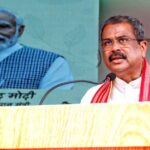
News Summary:
- India won six medals at the Paris Olympics, mirroring the tally from London 2012 but falling short of Tokyo 2020.
- Mental conditioning played a crucial role for athletes like the men’s hockey team, but inconsistent access to mental coaches highlighted the need for improvement.
- Long-term planning, increased funding, and a focus on potential medal winners are essential for India’s future Olympic success.
Why Did India Fall Short at the Paris Olympics?
The Paris Olympics 2024 presented a mixed bag for India. With a total of six medals—one silver and five bronze—India’s performance echoed the results of the London 2012 Olympics but was a step down from the seven medals secured in Tokyo 2020. Several Indian athletes came heartbreakingly close to winning medals but fell short by the narrowest of margins. For instance, Mirabai Chanu, a silver medallist from Tokyo, missed a bronze by just 1kg, lifting a total of 199kg when the bronze was won with 200kg. Such close calls point to the fine margins that separate victory from defeat at the highest level of competition.
One of the key takeaways from India’s campaign in Paris is the need for consistent mental conditioning across all sports disciplines. The Indian men’s hockey team, which won consecutive Olympic medals for the first time in 52 years, attributed a significant part of their success to mental conditioning coach Paddy Upton. However, this level of support was not uniformly available to all Indian athletes. For example, while the archery team had access to a psychologist, the badminton team did not, which may have contributed to their near misses in crucial matches.
How Can India Improve Its Olympic Performance in the Future?
To improve its performance in future Olympics, India must focus on a few key areas:
- Mental Conditioning: In today’s high-pressure sports environment, the mental aspect is as important as physical preparation. The Indian men’s hockey team’s success is a testament to the importance of mental conditioning. However, this support needs to be consistent across all sports and throughout the Olympic cycle, not just during the Games. Ensuring that athletes have access to mental conditioning coaches can help them handle the pressure of competition and perform at their best when it matters most.
- Long-Term Planning: India’s population-to-medal ratio is a stark reminder of the work that needs to be done. With six medals for a population of 1.45 billion, India’s ratio is one medal per 241.67 million people, far behind countries like China and the USA. To bridge this gap, India needs to significantly increase the number of athletes who qualify for the Olympics. This requires a long-term vision that looks beyond the next Olympic Games.The USA sent close to 600 athletes to Paris and won 126 medals, including 40 gold. In contrast, India sent only 117 athletes. To improve medal tallies, India must increase the number of qualifying athletes by investing in grassroots development, providing adequate training facilities, and employing a larger pool of qualified coaches.
- Support for Potential Winners: Identifying and nurturing potential medal winners is crucial. Athletes like Manu Bhaker, who redeemed herself after a disappointing Tokyo 2020, exemplify the importance of perseverance and support. Promising athletes like Lakshya Sen in badminton and Ankit Bhakat in archery showed potential but missed out on medals. These athletes must be given the resources and environment they need to thrive and come back stronger for the next Olympics.
Conclusion: Planting the Seeds for Future Success
India’s experience at the Paris Olympics has shown that while progress has been made, there is still much work to be done. The lessons learned—particularly the importance of mental conditioning, long-term planning, and targeted support for promising athletes—must be implemented with urgency. With the right strategies, increased funding, and a focus on nurturing talent, India can aim not just to compete but to excel on the global stage. The road to Olympic success is long and challenging, but the seeds of future triumphs must be sown now to ensure that India’s athletes can achieve their full potential in Los Angeles 2028 and beyond.




































Leave a Reply